七年级下册英语Unit3 How do you get to school? Section B(2a-2c) 课件(共38张PPT)
文档属性
| 名称 | 七年级下册英语Unit3 How do you get to school? Section B(2a-2c) 课件(共38张PPT) |  | |
| 格式 | zip | ||
| 文件大小 | 7.4MB | ||
| 资源类型 | 教案 | ||
| 版本资源 | 人教新目标(Go for it)版 | ||
| 科目 | 英语 | ||
| 更新时间 | 2021-03-22 20:45:50 | ||
图片预览

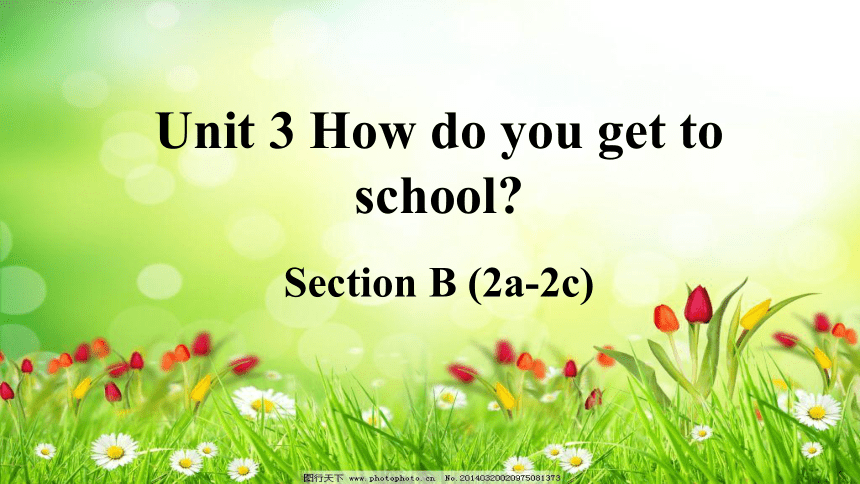
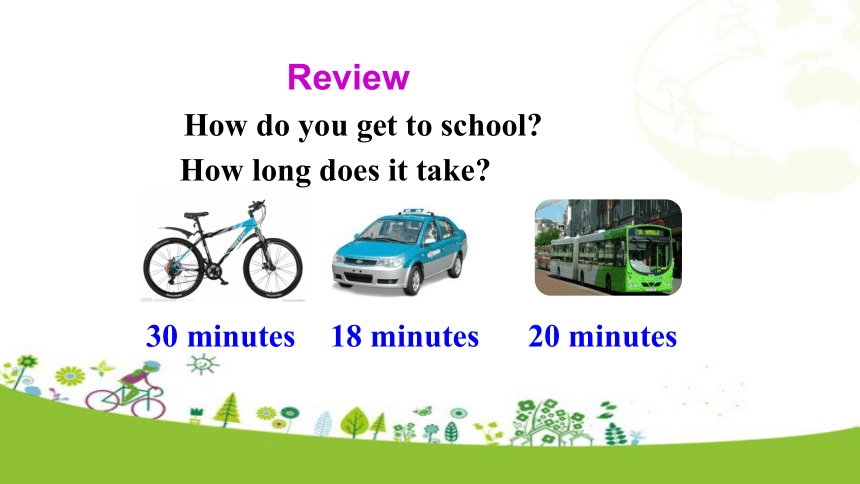
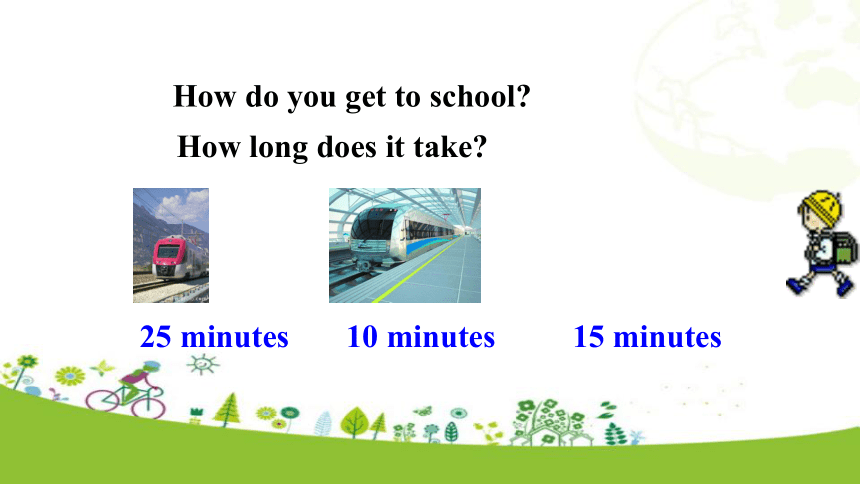
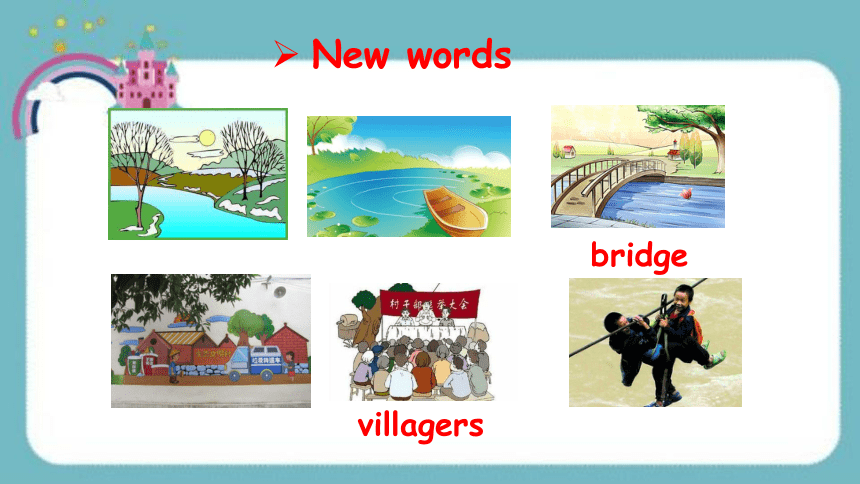
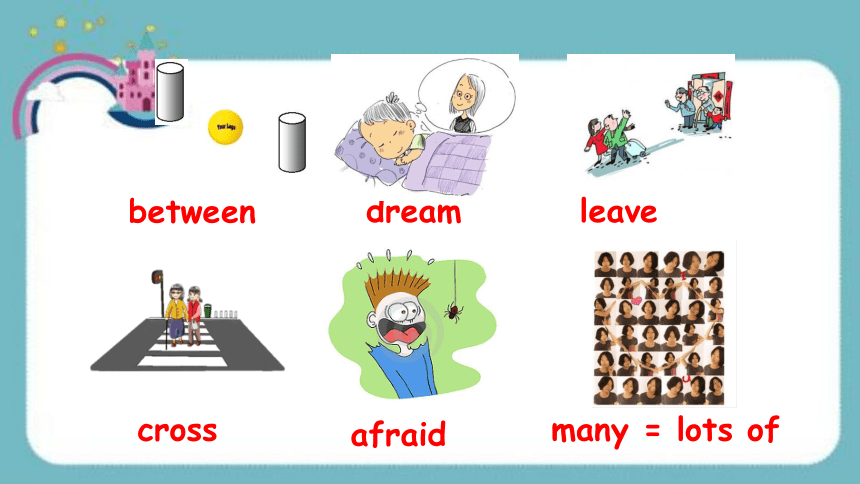
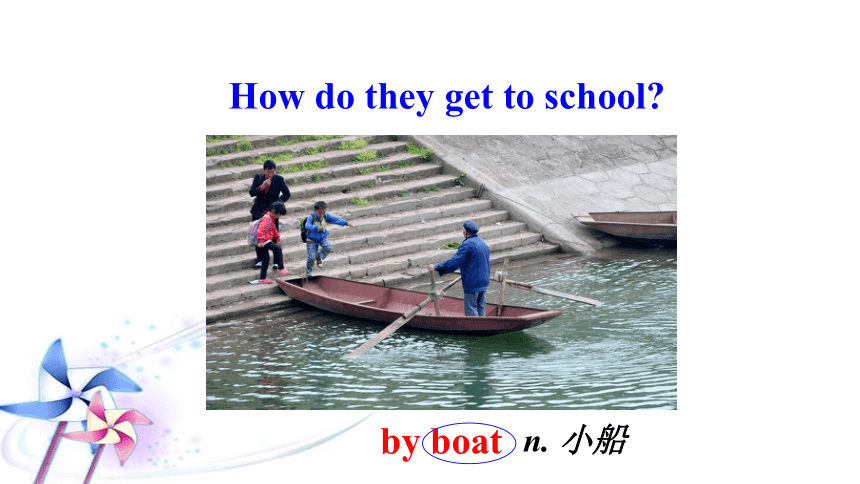
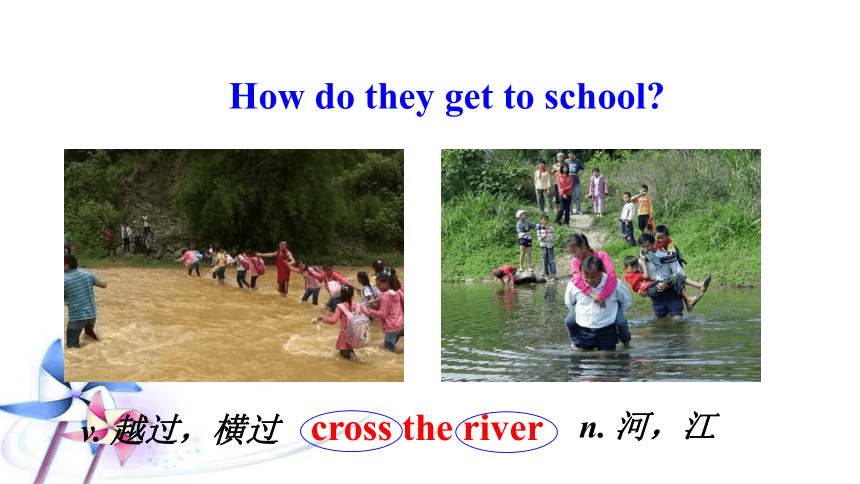
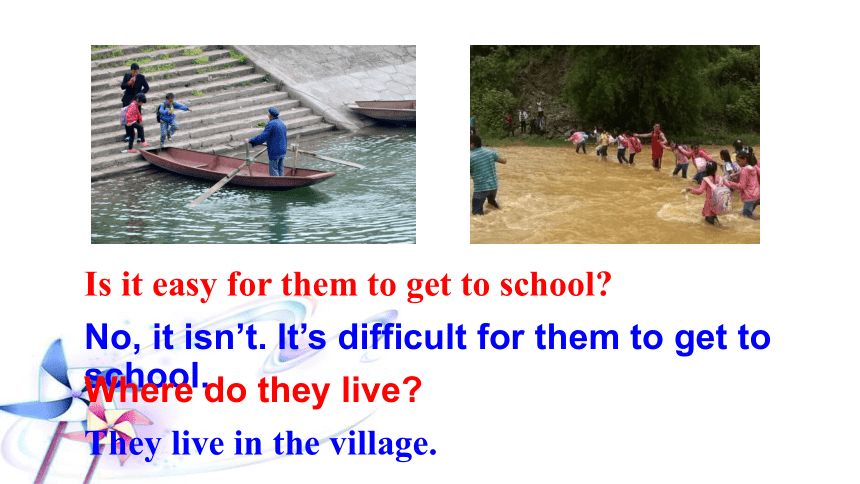
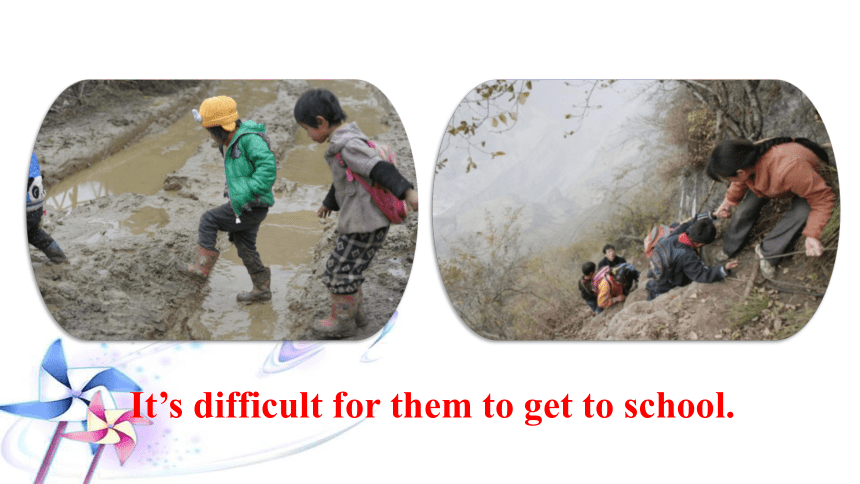
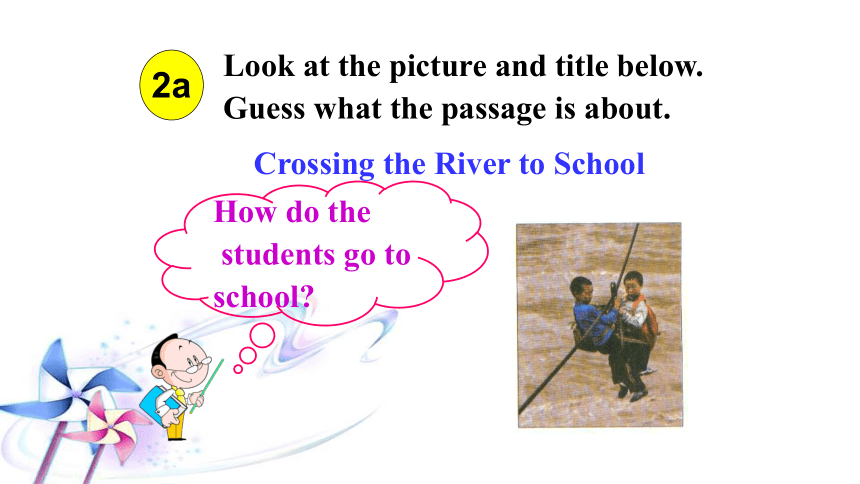
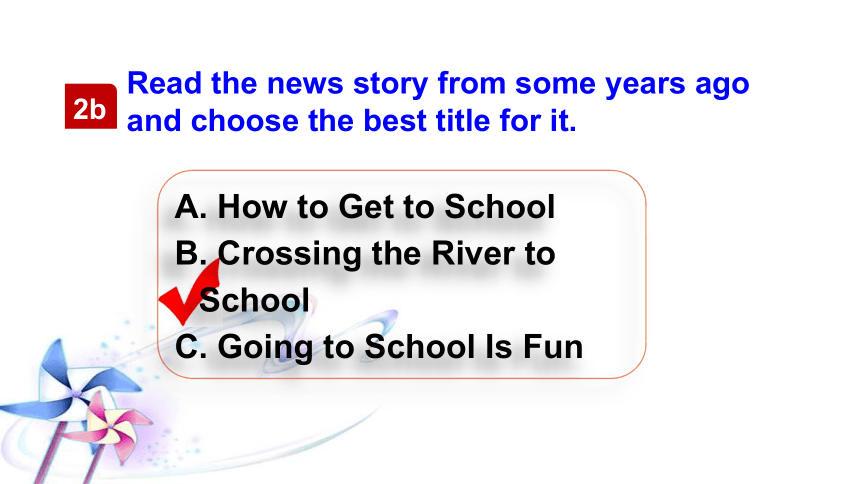
文档简介
(共38张PPT)
Unit
3
Section
B
(2a-2c)
Unit
3
How
do
you
get
to
school?
How
do
you
get
to
school?
How
long
does
it
take?
30
minutes
18
minutes
20
minutes
Review
How
do
you
get
to
school?
How
long
does
it
take?
25
minutes
10
minutes
15
minutes
bridge
villagers
New
words
dream
between
leave
afraid
many
=
lots
of
cross
How
do
they
get
to
school?
by
boat
n.
小船
cross
the
river
How
do
they
get
to
school?
v.
越过,横过
n.
河,江
Is
it
easy
for
them
to
get
to
school?
No,
it
isn’t.
It’s
difficult
for
them
to
get
to
school.
Where
do
they
live?
They
live
in
the
village.
It’s
difficult
for
them
to
get
to
school.
2a
Look
at
the
picture
and
title
below.
Guess
what
the
passage
is
about.
Crossing
the
River
to
School
How
do
the
students
go
to
school?
Read
the
news
story
from
some
years
ago
and
choose
the
best
title
for
it.
2b
How
to
Get
to
School
Crossing
the
River
to
School
Going
to
School
Is
Fun.
1.
How
do
the
students
in
the
village
go
to
school?
2.
Why
do
they
go
to
school
like
this?
3.
Does
the
boy
like
this
school?
Why?
4.
What’s
the
villagers’
dream?
Do
you
think
their
dream
can
come
true?
Why
or
why
not?
How
do
you
get
to
school?
Do
you
walk
or
ride
a
bike?
Do
you
go
by
bus
or
by
train?
For
many
students,
it
is
easy
to
get
to
school.
But
for
the
students
in
one
small
village
in
China,
it
is
difficult.
There
is
a
very
big
river
between
their
school
and
the
village.
There
is
no
bridge
and
the
river
runs
too
quickly
for
boats.
So
these
students
go
on
a
ropeway
to
cross
the
river
to
school.
Crossing
the
River
to
School
①
②
One
11-year-old
boy,
Liangliang,
crosses
the
river
every
school
day.
But
he
is
not
afraid
because
he
loves
school.
“I
love
to
play
with
my
classmates.
And
I
love
my
teacher.
He’s
like
a
father
to
me.”
Many
of
the
students
and
villagers
never
leave
the
village.
It
is
their
dream
to
have
a
bridge.
Can
their
dream
come
true?
上学日
玩;与……玩耍
③
④
1.
They
go
on
a
ropeway
to
cross
the
river
to
school.
2.
Because
there
is
a
big
river
between
their
school
and
the
village.
There’s
no
bridge
and
the
river
runs
too
quickly
for
boats.
3.
Yes,
he
does.
He
loves
to
play
with
his
classmates.
He
loves
his
teacher.
4.
Their
dream
is
to
have
a
bridge.
Yes.
I
think
so.
Many
kind
people
will
help
them.
Reporter:
How
do
you
_______
to
school,
Liangliang?
Liangliang:
I
go
on
a
ropeway
to
_______
the
river
to
school.
Reporter:
Are
you
_________?
Liangliang:
No,
I’m
not.
Because
I
_____
my
school
and
my
teachers.
I
like
to
Read
the
story
again
and
complete
the
interview.
get
love
2c
afraid
cross
_____
with
my
classmates
at
school.
Reporter:
Is
it
_________for
you
to
go
to
school?
Liangliang:
Yes,
it
is.
Reporter:
Do
you
want
to
have
a
________?
Liangliang:
Yes.
It’s
our
dream.
Reporter:
I’m
sure
your
dream
can
come
_____.
play
difficult
true
bridge
1.
There
is
a
very
big
river
between
their
school
and
the
village.
there
be侧重于客观存在的“有”,强调存在的状态。在there
be结构中,主语应放在be动词之后,并且be动词的形式应与主语保持一致。
如:
There
are
many
apples
on
the
tree.
Language
points
【拓展】
have侧重于主观方面,强调“所属”
关系,表示“拥有,占有,具有”。在这一结构中,have与主语保持人称和数的一致。
如:
She
has
a
nice
schoolbag.
between
…
and
…
在……与……之间
between
是个介词,表示在两者之间。
如:
Mary
is
between
Jane
and
Linda
in
the
line.
在队伍中,玛丽在简和琳达之间。
2.
For
many
students,
it
is
easy
to
get
to
school.
It’s+形容词(+for
sb.)+to
do
sth.
(对某人来说)
做某事是……的
英语中,
动词不定式作主语时,
常用it作形式主语放在句子的开头,
而将真正的主语(动词不定式)放在后面。
在冬季玩雪是很有趣的。
___
is
interesting
___
____
with
snow
in
winter.
It
to
play
3.
There
is
no
bridge
and
the
river
runs
too
quickly
for
boats.
河上根本没有桥,而且水流很急,不适宜小船摆渡。
(1)
no
“完全不、根本没有”,在这里
构成否定句。当no
用于构成否定句,主要
用于名词前,强调否定其后面的名词。如:
There
is
no
apple
in
the
fridge.
冰箱里没有苹果了。
(2)
run
在这里表示“液体流动”。
它在不同的语境中有不同的用法和含义。例如:
Who
runs
the
business?
生意是谁经营的?
“run”表示
“管理;经营”
②
John
run
a
car
into
a
park.
约翰把车开进了公园。
“run”表示
“使行驶;驾驶”
③
The
road
runs
north.这条路伸向北方。
“run”表示
“延伸”
④
“run”
可以做名词
“奔跑,路程”
Let’s
go
for
a
run
across
the
field.
咱们去跑步,跑过那片田野吧。
It
is
an
hour’s
run
by
train
from
here
to
London.
从此地到伦敦搭火车有一小时的行程。
4.
One
11-year-old
boy,
Liangliang,
crosses
the
river
every
school
day.
一个11岁的男孩—亮亮,每天过河上学
。
11-year-old
为多个词汇构成的复合形容词,用连
字符“-”连接,用来修饰名词
boy。这种结构还
有很多,例如:
a
four-day
trip
一个四天的旅行
a
30-page
book
一本30页的书
注意:这里的“year,day,page”都是用单数。
5.
I
love
to
play
with
my
classmates.
喜爱做某事
love
to
do
sth.
love
doing
sth.
表示一时的喜欢或暂时性的具体动作
表示一惯的喜欢,倾向于一种习惯。
6.
They
have
to
cross
a
very
big
river
between
their
school
and
the
village.
have
to意为“必须;不得不”,
强调外界客观因素要求主语不得不做某事,有人称、时态和数的变化,其后接动词原形。
辨析:have
to与must
have
to
must
“必须;不得不”,表示客观的需要,有人称、数、时态的变化。don’t/doesn’t
have
to表示“不必”。
“必须;一定”,表示说话人主观上的看法。mustn’t表示“禁止”。
7.
afraid
adj.
害怕的;畏惧的
Are
you
afraid
of
snakes?
Children
feel
afraid
when
they
are
at
home
alone.
I’m
afraid
to
speak
in
front
of
other
people.
He’s
afraid
of
speaking
in
public.
be
afraid
to
do
sth.
害怕做某事
afraid
of
sth.
/
sb.
怕某事/某人
afraid
of
v
-ing
怕做某事
注意:1.
afraid是表语形容词
2.
I
am
afraid有时指I
am
sorry。
I'm
afraid
we
can't
come.
8.
He’s
like
a
father
to
me.
like
在这里作介词,而不是动词,意为“像”。
The
fish
looks
like
a
big
boat.
那条鱼看起来像条船
。(介词)
Jane
likes
history
very
much.
简很喜欢历史。
(动词)
9.
leave
v.
离开
Please
turn
off
the
light
when
you
leave.
The
train
will
leave
in
a
second.
“leave
for
+
地点”表示“动身去某地”
He
is
leaving
for
Shanghai
tomorrow.
“leave+
地点
+
for
+
地点”表示“离开某地去某地”
Why
are
you
leaving
Shanghai
for
Beijing?
How
is
your
uncle
leaving
Wenling
for
Hangzhou?
Look!
There
are
some
boats
on
the
r___
_.
2.
Who
is
the
boy
b______
your
mother
and
father?
3.
—
How
old
is
your
sister?
—
She’s
twelve
y____
old.
4.
My
mom
always
says
“Have
a
good
d_____!”
before
I
go
to
bed.
5.
When
the
girl
sees
the
dog,
she’s
always
a______.
river
between
years
dream
afraid
根据句意及首字母提示完成单词。
Exercise
二、用括号内单词的适当形式填空。
1.
Is
it
easy
for
them
______
(get)
to
school?
2.
The
river
runs
too
_______
(quick)
for
boats.
3.
His
brother
_______
(cross)
the
river
on
a
ropeway
every
day.
4.
Can
this
dream
_____
(come)
true?
come
to
get
crosses
quickly
5.
All
the
_________
(village)
want
to
have
a
nice
bridge.
6.
It
takes
six
hours
to
get
to
his
_____________
(grandparents)
home.
villagers
grandparents’
三、选词填空。
1.
There’s
a
shop
_______
our
school
and
the
park.
think
of,
come
true,
by
boat,
on
a
ropeway,
between
between
2.
The
students
in
Kaishandao
goes
to
school
_______.
3.
—
How
do
they
cross
the
big
river?
—
They
go
____________.
4.
What
do
you
________
the
new
violin?
5.
His
parents’
dream
is
to
have
a
big
house.
They
think
it
can
_________
soon.
think
of
on
a
ropeway
by
boat
come
true
1.
我乘公交上学,你呢?
I
go
to
school
by
bus.
____
______
you?
2.
他家离汽车站不远。
His
home
is
not
____
_____
the
bus
station.
3.
桌子上有一个杯子。
______
____
a
cup
on
the
desk.
4.
我喜欢和我的狗狗玩。
I
love
to
_____
_____
my
dog.
5.
我希望你的梦想能早日实现。
I
hope
your
dream
can
_____
____
soon.
How
about
far
from
play
with
come
true
There
is
四.
根据汉语意思完成英语句子,每空一词。
空白演示
单击输入您的封面副标题
Unit
3
Section
B
(2a-2c)
Unit
3
How
do
you
get
to
school?
How
do
you
get
to
school?
How
long
does
it
take?
30
minutes
18
minutes
20
minutes
Review
How
do
you
get
to
school?
How
long
does
it
take?
25
minutes
10
minutes
15
minutes
bridge
villagers
New
words
dream
between
leave
afraid
many
=
lots
of
cross
How
do
they
get
to
school?
by
boat
n.
小船
cross
the
river
How
do
they
get
to
school?
v.
越过,横过
n.
河,江
Is
it
easy
for
them
to
get
to
school?
No,
it
isn’t.
It’s
difficult
for
them
to
get
to
school.
Where
do
they
live?
They
live
in
the
village.
It’s
difficult
for
them
to
get
to
school.
2a
Look
at
the
picture
and
title
below.
Guess
what
the
passage
is
about.
Crossing
the
River
to
School
How
do
the
students
go
to
school?
Read
the
news
story
from
some
years
ago
and
choose
the
best
title
for
it.
2b
How
to
Get
to
School
Crossing
the
River
to
School
Going
to
School
Is
Fun.
1.
How
do
the
students
in
the
village
go
to
school?
2.
Why
do
they
go
to
school
like
this?
3.
Does
the
boy
like
this
school?
Why?
4.
What’s
the
villagers’
dream?
Do
you
think
their
dream
can
come
true?
Why
or
why
not?
How
do
you
get
to
school?
Do
you
walk
or
ride
a
bike?
Do
you
go
by
bus
or
by
train?
For
many
students,
it
is
easy
to
get
to
school.
But
for
the
students
in
one
small
village
in
China,
it
is
difficult.
There
is
a
very
big
river
between
their
school
and
the
village.
There
is
no
bridge
and
the
river
runs
too
quickly
for
boats.
So
these
students
go
on
a
ropeway
to
cross
the
river
to
school.
Crossing
the
River
to
School
①
②
One
11-year-old
boy,
Liangliang,
crosses
the
river
every
school
day.
But
he
is
not
afraid
because
he
loves
school.
“I
love
to
play
with
my
classmates.
And
I
love
my
teacher.
He’s
like
a
father
to
me.”
Many
of
the
students
and
villagers
never
leave
the
village.
It
is
their
dream
to
have
a
bridge.
Can
their
dream
come
true?
上学日
玩;与……玩耍
③
④
1.
They
go
on
a
ropeway
to
cross
the
river
to
school.
2.
Because
there
is
a
big
river
between
their
school
and
the
village.
There’s
no
bridge
and
the
river
runs
too
quickly
for
boats.
3.
Yes,
he
does.
He
loves
to
play
with
his
classmates.
He
loves
his
teacher.
4.
Their
dream
is
to
have
a
bridge.
Yes.
I
think
so.
Many
kind
people
will
help
them.
Reporter:
How
do
you
_______
to
school,
Liangliang?
Liangliang:
I
go
on
a
ropeway
to
_______
the
river
to
school.
Reporter:
Are
you
_________?
Liangliang:
No,
I’m
not.
Because
I
_____
my
school
and
my
teachers.
I
like
to
Read
the
story
again
and
complete
the
interview.
get
love
2c
afraid
cross
_____
with
my
classmates
at
school.
Reporter:
Is
it
_________for
you
to
go
to
school?
Liangliang:
Yes,
it
is.
Reporter:
Do
you
want
to
have
a
________?
Liangliang:
Yes.
It’s
our
dream.
Reporter:
I’m
sure
your
dream
can
come
_____.
play
difficult
true
bridge
1.
There
is
a
very
big
river
between
their
school
and
the
village.
there
be侧重于客观存在的“有”,强调存在的状态。在there
be结构中,主语应放在be动词之后,并且be动词的形式应与主语保持一致。
如:
There
are
many
apples
on
the
tree.
Language
points
【拓展】
have侧重于主观方面,强调“所属”
关系,表示“拥有,占有,具有”。在这一结构中,have与主语保持人称和数的一致。
如:
She
has
a
nice
schoolbag.
between
…
and
…
在……与……之间
between
是个介词,表示在两者之间。
如:
Mary
is
between
Jane
and
Linda
in
the
line.
在队伍中,玛丽在简和琳达之间。
2.
For
many
students,
it
is
easy
to
get
to
school.
It’s+形容词(+for
sb.)+to
do
sth.
(对某人来说)
做某事是……的
英语中,
动词不定式作主语时,
常用it作形式主语放在句子的开头,
而将真正的主语(动词不定式)放在后面。
在冬季玩雪是很有趣的。
___
is
interesting
___
____
with
snow
in
winter.
It
to
play
3.
There
is
no
bridge
and
the
river
runs
too
quickly
for
boats.
河上根本没有桥,而且水流很急,不适宜小船摆渡。
(1)
no
“完全不、根本没有”,在这里
构成否定句。当no
用于构成否定句,主要
用于名词前,强调否定其后面的名词。如:
There
is
no
apple
in
the
fridge.
冰箱里没有苹果了。
(2)
run
在这里表示“液体流动”。
它在不同的语境中有不同的用法和含义。例如:
Who
runs
the
business?
生意是谁经营的?
“run”表示
“管理;经营”
②
John
run
a
car
into
a
park.
约翰把车开进了公园。
“run”表示
“使行驶;驾驶”
③
The
road
runs
north.这条路伸向北方。
“run”表示
“延伸”
④
“run”
可以做名词
“奔跑,路程”
Let’s
go
for
a
run
across
the
field.
咱们去跑步,跑过那片田野吧。
It
is
an
hour’s
run
by
train
from
here
to
London.
从此地到伦敦搭火车有一小时的行程。
4.
One
11-year-old
boy,
Liangliang,
crosses
the
river
every
school
day.
一个11岁的男孩—亮亮,每天过河上学
。
11-year-old
为多个词汇构成的复合形容词,用连
字符“-”连接,用来修饰名词
boy。这种结构还
有很多,例如:
a
four-day
trip
一个四天的旅行
a
30-page
book
一本30页的书
注意:这里的“year,day,page”都是用单数。
5.
I
love
to
play
with
my
classmates.
喜爱做某事
love
to
do
sth.
love
doing
sth.
表示一时的喜欢或暂时性的具体动作
表示一惯的喜欢,倾向于一种习惯。
6.
They
have
to
cross
a
very
big
river
between
their
school
and
the
village.
have
to意为“必须;不得不”,
强调外界客观因素要求主语不得不做某事,有人称、时态和数的变化,其后接动词原形。
辨析:have
to与must
have
to
must
“必须;不得不”,表示客观的需要,有人称、数、时态的变化。don’t/doesn’t
have
to表示“不必”。
“必须;一定”,表示说话人主观上的看法。mustn’t表示“禁止”。
7.
afraid
adj.
害怕的;畏惧的
Are
you
afraid
of
snakes?
Children
feel
afraid
when
they
are
at
home
alone.
I’m
afraid
to
speak
in
front
of
other
people.
He’s
afraid
of
speaking
in
public.
be
afraid
to
do
sth.
害怕做某事
afraid
of
sth.
/
sb.
怕某事/某人
afraid
of
v
-ing
怕做某事
注意:1.
afraid是表语形容词
2.
I
am
afraid有时指I
am
sorry。
I'm
afraid
we
can't
come.
8.
He’s
like
a
father
to
me.
like
在这里作介词,而不是动词,意为“像”。
The
fish
looks
like
a
big
boat.
那条鱼看起来像条船
。(介词)
Jane
likes
history
very
much.
简很喜欢历史。
(动词)
9.
leave
v.
离开
Please
turn
off
the
light
when
you
leave.
The
train
will
leave
in
a
second.
“leave
for
+
地点”表示“动身去某地”
He
is
leaving
for
Shanghai
tomorrow.
“leave+
地点
+
for
+
地点”表示“离开某地去某地”
Why
are
you
leaving
Shanghai
for
Beijing?
How
is
your
uncle
leaving
Wenling
for
Hangzhou?
Look!
There
are
some
boats
on
the
r___
_.
2.
Who
is
the
boy
b______
your
mother
and
father?
3.
—
How
old
is
your
sister?
—
She’s
twelve
y____
old.
4.
My
mom
always
says
“Have
a
good
d_____!”
before
I
go
to
bed.
5.
When
the
girl
sees
the
dog,
she’s
always
a______.
river
between
years
dream
afraid
根据句意及首字母提示完成单词。
Exercise
二、用括号内单词的适当形式填空。
1.
Is
it
easy
for
them
______
(get)
to
school?
2.
The
river
runs
too
_______
(quick)
for
boats.
3.
His
brother
_______
(cross)
the
river
on
a
ropeway
every
day.
4.
Can
this
dream
_____
(come)
true?
come
to
get
crosses
quickly
5.
All
the
_________
(village)
want
to
have
a
nice
bridge.
6.
It
takes
six
hours
to
get
to
his
_____________
(grandparents)
home.
villagers
grandparents’
三、选词填空。
1.
There’s
a
shop
_______
our
school
and
the
park.
think
of,
come
true,
by
boat,
on
a
ropeway,
between
between
2.
The
students
in
Kaishandao
goes
to
school
_______.
3.
—
How
do
they
cross
the
big
river?
—
They
go
____________.
4.
What
do
you
________
the
new
violin?
5.
His
parents’
dream
is
to
have
a
big
house.
They
think
it
can
_________
soon.
think
of
on
a
ropeway
by
boat
come
true
1.
我乘公交上学,你呢?
I
go
to
school
by
bus.
____
______
you?
2.
他家离汽车站不远。
His
home
is
not
____
_____
the
bus
station.
3.
桌子上有一个杯子。
______
____
a
cup
on
the
desk.
4.
我喜欢和我的狗狗玩。
I
love
to
_____
_____
my
dog.
5.
我希望你的梦想能早日实现。
I
hope
your
dream
can
_____
____
soon.
How
about
far
from
play
with
come
true
There
is
四.
根据汉语意思完成英语句子,每空一词。
空白演示
单击输入您的封面副标题
同课章节目录
- Unit 1 Can you play the guitar?
- Section A
- Section B
- Unit 2 What time do you go to school?
- Section A
- Section B
- Unit 3 How do you get to school?
- Section A
- Section B
- Unit 4 Don't eat in class.
- Section A
- Section B
- Unit 5 Why do you like pandas?
- Section A
- Section B
- Unit 6 I'm watching TV.
- Section A
- Section B
- Review of Units 1-6
- Unit 7 It's raining!
- Section A
- Section B
- Unit 8 Is there a post office near here?
- Section A
- Section B
- Unit 9 What does he look like?
- Section A
- Section B
- Unit 10 I'd like some noodles.
- Section A
- Section B
- Unit 11 How was your school trip?
- Section A
- Section B
- Unit 12 What did you do last weekend?
- Section A
- Section B
